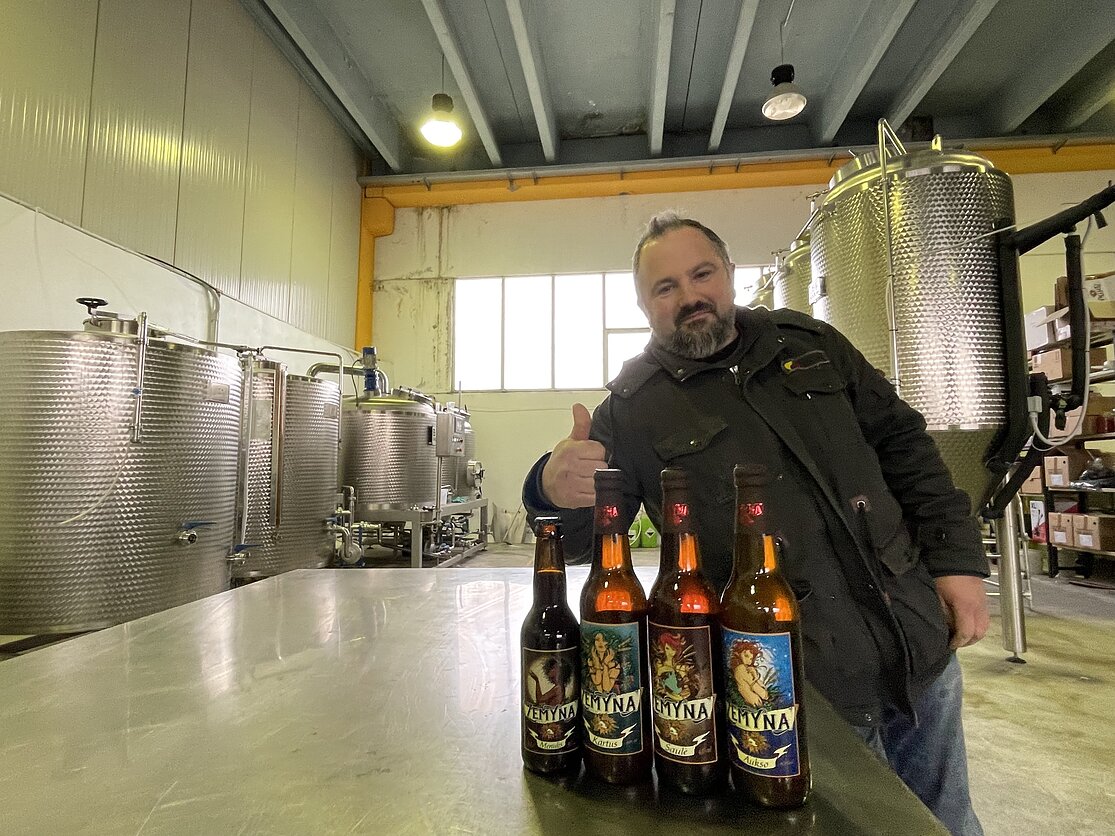
In Sardinia, one can find beers with Lithuanian names: Saulė (Sun), Mėnulis (Moon), Aukso (Golden), Kartus (Bitter). They are made at a local brewery named after the Lithuanian goddess Žemyna. Even more surprisingly, the brewers have no links to and never visited the country some 2,500 kilometres from the Italian island, writes Daiva Lapėnaitė for LRT.lt.
The town of Nuoro lies almost 200 kilometres from Cagliari, the capital of Sardinia, and the Mediterranean coast. Due to its safe distance from the coast and the protection of the surrounding mountains, people have settled in the area since the Neolithic times. One theory suggests that the name of Nuoro derives from the words “home”, “light” and “fire”, things that provide security.
Now the fifth largest town in the Italian island of Sardinia with 37,000 inhabitants, Nuoro is famous for its unique surviving settlements from the Nuragic civilization (15th-8th centuries BC), its open-air galleries, its landscapes and for being the birthplace of the first Nobel Prize-winning Italian female writer Grazia Deledda.
 When she went to Nuoro to meet Valentino Corsi, brewer and co-founder of the Žemyna brewery, Daiva Lapėnaitė thought she would hear a story of an Italian falling in love with a Lithuanian girl and dedicating the product to her far-away homeland. But that was far from the truth.
When she went to Nuoro to meet Valentino Corsi, brewer and co-founder of the Žemyna brewery, Daiva Lapėnaitė thought she would hear a story of an Italian falling in love with a Lithuanian girl and dedicating the product to her far-away homeland. But that was far from the truth.
Žemyna was founded by five friends from Nuoro who had never been to Lithuania, had never heard the Lithuanian language, and never met any Lithuanians until Lapėnaitė visited.
Valentino Corsi admitted to having three passions: quality beer, Krav Maga (an Israeli martial art) and mythology, especially Baltic mythology. The 52-year-old started brewing beer when he was young: at home, in pots. His first attempts were not very successful, so over the years he studied production, technology, history, polished the recipe, and kept dreaming of founding his own brewery. However, he had no money and put his dream on hold in order to make a living from other things.
He worked for many years in the construction industry, in the heating systems sector, but when construction came to a standstill eight years ago, he decided it was time to realize his old dream. He and his four friends took the plunge: they pooled thir savings, rented a place, and started brewing craft beer.
 At the time, he was reading a book about the history of brewing. One chapter contained the following lines: “In Lithuanian mythology, Žemyna is the personification of Mother Earth, the patron saint of cultivated fields and fertile crops, animals and people. Žemyna was considered the daughter of the Sun and the Moon. She was worshipped with very strict rituals: libation had to be performed with great precision, as the slightest mistake, according to the myth, could lead to terrible consequences.
At the time, he was reading a book about the history of brewing. One chapter contained the following lines: “In Lithuanian mythology, Žemyna is the personification of Mother Earth, the patron saint of cultivated fields and fertile crops, animals and people. Žemyna was considered the daughter of the Sun and the Moon. She was worshipped with very strict rituals: libation had to be performed with great precision, as the slightest mistake, according to the myth, could lead to terrible consequences.
“In some regions of Lithuania, beer was an integral part of the courtship ritual. When a young man wanted to marry a girl, he had to pass a kind of test involving three visits to the girl’s father. On the second visit, the father and the suitor would share a mug of exceptionally good beer, but before drinking, they would pour some of the beer on the ground as a tribute and offering to the Earth.” He read this and immediately named the brewery “Žemyna”, and the first beer we brewed was “Saulė” (the sun, in Lithuanian).
Lapėnaitė describes the beer as having grassy flavours that give way to swirls of white melon or caramel. Strokes of coffee sipped under a cocoa tree to chocolate and the crumb of home-made bread. Sardinian tangerines, lemons, and oranges with tropical mango and passion fruit on a soft pillow of hops.
The labels were drawn by a well-known graphic designer who won a Warner Bros competition for Disney, known by his artistic nickname Grim. The brewer admits that they do not yet have a huge capacity, but enough to be present in a selection of Sardinian wineries, bars, and restaurants.
Valentino says that he is not interested in expanding to the whole of Italy and international markets. However, there is one exception: “I have a dream that our beers should be in Lithuania, whose mythology is the inspiration for our art as brewers and for the existence of the brewery.”



























